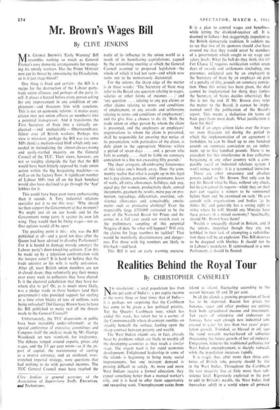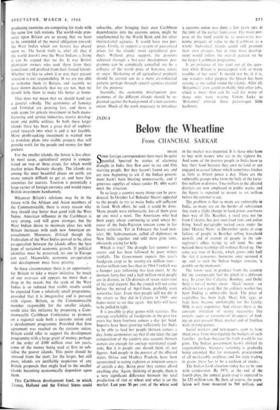Realities Behind the Royal Tour
By CHRISTOPHER CASSERLEY
No revolution : a total population less than one per cent of India's: a per capita income at the worst three or four times that of India— it is perhaps not surprising that the Caribbean has come to be given a low political priority. Yet the Queen's Caribbean tour, which has ended this week, has taken her to a corner of the Commonwealth where discontent rumbles on steadily beneath the surface, feeding upon the sharp contrast between poverty and wealth.
The West Indian islands are, in fact, already beset by problems which are likely to trouble all the developing countries as they reach a similar stage. The urgent need is for rapid economic development. Enlightened leadership in some of the islands is beginning to bring many social improvements, but one insistent demand is proving difficult to satisfy. As more and more West Indians receive a formal education, they expect something better than a manual worker's rtile, and it is hard to offer them opportunity and rewarding work. Unemployment varies from island to island, fluctuating according to the season between 10 and 20 per cent.
In all the islands a growing proportion of food has to be imported. Recent low prices for bananas, sugar and other produce are cutting back both agricultural income and investment. Ten years of enterprise and endeavour in Jamaica have seen enough new industrial jobs created to cater for less than two years' popu- lation growth. Trinidad, so blessed in oil, sees the trend towards market-based oil refineries threatening the future growth of her oil industry. Emigration, hitherto the traditional palliative for West Indian unemployment, is sharply reduced, while the population increases rapidly.
It is tragic that, after more than three cen- - tunies of British rule, poverty should be rife in -the West Indies. Throughout the Caribbean the vast majority live at little more than sub- sistence level. Rigorously exploited in the past to add to Britain's wealth, the West Indies find themselves adrift in a world where all primary
producing countries are competing for trade with the same few rich nations. The world-wide pres- surcs upon Britain are so strong that we have to be reminded of the moral obligation towards the West Indies which our history has placed upon us. The harsh truth is, after all, that if the world doesn't owe the West Indians a living it can be argued that we do. It was British plantation owners who took them from their homelands and profited from their forced labotir. Whether we like to admit it or not, their present situation is our responsibility. If we are not able to welcome them to Britain, and recently we have shown decisively that we are not, then we should help them to make life better at home.
That does not mean that we should hand out a general subsidy. The economies of Jamaica and Trinidad are growing fast, and there is wide scope for private investment in both manu- facturing and service industries, tourist develop- ment and public utilities. In both these larger islands there has been a great deal of sophisti- cated research into what is and is not feasible. More profit-seeking investment is wanted now to translate plans into visible projects that will provide work for the people and money for their pockets.
For the smaller islands, the future is less clear. In most cases, agricultural output is concen- trated on two or three crops, for which world market prices fluctuate sharply. The islands are among the most beautiful places on earth, yet many remain difficult to get at, and have few amenities for tourists. Tourism is potentially a large earner of foreign currency and would repay British investment handsomely.
Whatever Britain's relations may be in the future with the African and Asian members of the Commonwealth, there is every reason Why they should stay better than good with the West Indies. American influence in the Caribbean is very strong, and will grow stronger, but fhe West Indian desire to maintain close ties with Britain increases with each new American en- croachment. Moreover, ill-fated though the Federation of the West Indies proved to be, close co-operation between the islands offers the best hope of sustained economic growth. If politleal identities must be preserved, no one in Europe can cavil. Meanwhile, economic co-operation and development must have priority.
In these circumstances there is an opportunity for Britain to take a major initiative. So much of our overseas aid appears no more than a drop in the ocean; but the scale of the West Indies is so reduced that visible results could be expected from a relatively small programme, provided that it is imaginative and is pursued with vigour. Britain, as the Commonwealth member responsible for the smaller islands, could take this initiative by proposing a Com- monwealth Caribbean Conference to promote on a regional scale both a customs union and a development programme. Provided that firm agreement was reached on the customs union, Britain could offer to support the development programme with a large grant of money, perhaps of the order of £100 million over ten years, some of the money being used at first to sub- sidise the poorer islands. This point should be stressed from the start; for the larger, but still poor, islands are justifiably suspicious of any British proposals that might lead to the smaller islands becoming economically dependent upon them.
This Caribbean development fund, to which 7:rance, Holland and the United States could
subscribe, after bringing- their own Caribbean dependencies into the customs union, might be supplemented by the World Bank and the other international agencies. It would have two pur- poses. Firstly, to support a system of guaranteed prices for the islands' main agricultural pro- ducts. Without price support, the progress achieved through a five-year development pro- gramme can be completely cancelled out by a collapse of the world price of bananas, cocoa or sugar. Marketing of all agricultural products should be carried out to a more co-ordinated pattern, perhaps through special agencies created for the purpose.
Secondly, the economic development pro- grammes of the different islands should be re- planned against the background of a new customs union. Much of the work necessary to introduce 'a customs union was done a few years ago, at the time of the earlier federation. The main pur- pose of the fund would be to underwrite eco- nomic projects of value to the Caribbean as a whole. IndiN idual islands could still promote their oval projects, but in time most develop- ment would folloy, the overall pattern set by the larger Caribbean programme.
Is an initiative of this kind out of the ques- tion while Britain is preoccupied with so many troubles of her oval? It should not be; if it is, one wonders what purpose the Queen has been serving as she sailed round the islands. After all. 'Britannia's' crew could probably find other jobs, which is more than can be said for many of those who were waving Union Jacks as 'Britannia' entered those picturesque little harbours.



































 Previous page
Previous page